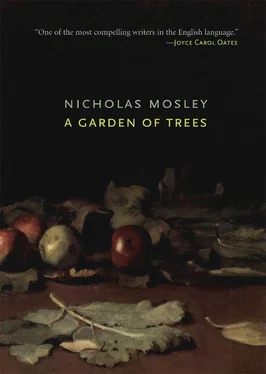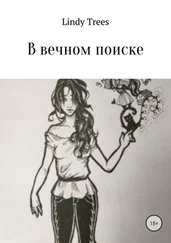In all these evenings — Mr. Palmerston’s huge face with the moon upon its cheek-bone, the cold room listening, the dampness of walls outside which there is the darkness waiting like water round a ship — there is nothing that I can do, I cannot do as he asks me, there is no I to do it when the centre is not there. I see the savagery of eyes that are kind and terrible, the sad night face that weeps and weeps, the collar like a horizon between dark and dark, the cold moon running as if with oil at some last benediction. I hear the voice beautifully modulated and controlled beginning and going on in one key always from creation to birth to death to deliverance and it all goes past me in a wild thin stream and I am left again in silence when the sound has gone. It is like an autumn night in the long lost grass when you stand and hear the sound of swans’ wings above you, a stream of swan-water flying whirring round the world and it gets very close to you, very close to your heart, and yet when it has gone you are still alone and loveless, although the earth is circled the mystery is apart. Whatever was happening to me happened in the spaces outside, and was not within me.
With Marius, too, in the mornings, it was as if my consciousness were more with him than with myself. He did not make things difficult. In talking to him there was always the feeling that he had ceased to be the person I had known before, that instead of being able to impose his will by subtlety he was now more concerned with the simplicity of making his will seem absent; but that it was possible, nevertheless, to understand that he was the same and to see the course of his change. Once he had dealt with life like a juggler; and now, with the suddenness of a child, he had given up his toys and was letting life do the juggling for him. In this condition, somehow his character was stronger. All the things that he had said a year ago were still part of him, yet by ceasing to impose them he made their presence more felt. He said that his marriage had died, and I wondered if what he had believed had died too; but it hadn’t and neither had his marriage — what he said was not true. It was rather his selfishness that had died. He had searched for his centre by heightening his power and he found it only when his power had failed. In this sense, really, his marriage lived.
That I felt myself nothing when in his presence was part of this, inevitably, — what there had been between us a year ago was a juggling game of power and now the desire for power had gone. There was the possibility of something being put in its place, but not the fact of it — a game that was played beyond us, in which our desires did not create the rules but rather had to be subordinated to them. I was conscious of this possibility as one is conscious of a truth that is at the moment beyond one’s comprehension; but it was not Marius, as he had said, who could give me understanding. At times I felt so much less than him that if he had been selfish it would have been awkward, but as it happened he did not seem to notice the disparity in our states. He kept me amused, and I listened to him. He was never sad. It is always this that I remember, that he was productive of happiness. Whatever he said about himself was not true of what he gave. On the surface we lived with each other irrelevantly, with myself as looker-on, but there was always something relevant in what I saw of myself in Marius.
One day I went to Church. I did this only in order to see if there was anything I had forgotten. I went indifferently and yet warily, as if I were having some joke within myself. I was surprised to see how much I remembered. There were memories of schools, of the smell of stale clothing, of the incongruous backs of necks. I became lulled in the old inertness which was broken only by the recurrent pain of kneeling. I found that I could do what I was supposed to do, that there was nothing I had forgotten. I sang descants to the hymns, got the timing of the psalms right, went through the words of the confession. And then, as always, my thoughts wandered away from what was going on around me. This always happens when nothing seems to be going on at all.
The words wander, music wanders, why should thoughts keep still? It is not of myself I should be thinking. Words and music drone without form and without ability, they are like the noises of birds, and should I notice birds? The building is not ugly. But the people, here, is it true that no one beautiful ever goes to Church? They are supposed to be beautiful. They whisper and do not care for each other, and yet I must hope they are beautiful. Can beautiful people kneel and say that they are ugly? If they are beautiful, do they need to go to Church? Church is for nothingness in the memory of schools.
The words are words and they do not mean much to me. A stream without sound no closer than the door. And yet there is something else I should think of. On the altar there is something that is never not beautiful, a body in silver shod with candles of light. There is sacrilege done each day in church, but not to the altar. Why is not sacrilege done more often? For one who believes in nothing it should be possible to think of it. A piece of smashed silver and a crumb on the carpet: a falling body spilling its blood against the stone. And yet it is not possible. These are trifles, explainable by custom, and yet they frighten me. Would it even be possible to sneer at a priest?
I cannot even say to Mr. Palmerston that all this means nothing to me. I cannot say that everything cancels out and has its opposite, that beauty is cancelled by ugliness, hope by despair, Christ by humanity. I cannot say that I have been to Church and that is one world and soon I shall be walking in the street and that is another world, and that it is absurd to join them because there is nothing in between. There are bits of people that live in one world and people who live in the other. I cannot say this to him because it would frighten me. And are the bits really any less of machinery? I have watched them and would not like to believe this. I cannot say to Mr. Palmerston — I have heard you and thought about it and I do not care a damn.
I left the church. I walked in my world which was not a world and I had my jokes which were, at most, jokes against myself. I had forgotten that my world was not a world. I came to a cross-roads where traffic was passing, and I waited for the lights to change so that I might cross. It was then that I was reminded. I watched a small car approaching and as it drew near me I knew that it was familiar although I did not know whose it was, and even after I had seen the occupants who were Annabelle and her father the recognition of them did not strike me, and it was only after they had been drawn up beside me for an instant that I knew who they were. They sat side by side staring rigidly in front of them, and as I stepped forwards in response to my surprise they did not move and did not look at me, and so I stopped, I thought they must have seen me, I thought they must be ignoring me because they did not wish to speak. I remembered then that this would be possible. I stood stupidly not being able to go forwards or back while people pushed past me and I did not know what to do, I wished only that they might not be made to do something that would hurt me. I pretended that I had not seen them, I waited terribly while the seconds dragged like hours and then I moved to the back of the car because I could not bear it. When the lights changed again the car went away and I found myself trembling. Then I did not think that they could have seen me, I did not believe it, but I did not know. I only knew that it was true that I had imagined it.
So, beginning to walk again, I knew what was terrible. It was I who had asked for this and now I had got it. No one else could have told me but her, and what she has told me is this sickness of it. Sickness of a world that is nothing, that kills what it loves, that on a grey carved day once made her cry, that in brutality betrayed itself. There is no love that I would not kill that was the means of life to me, no madness that I would not allow in the name of sanity. O fool, fool, there was a love that was given to you, a love that you would not give to, you ugly damned fool to pretend you do not care. Walking dead and unbearable this is what you cannot bear, you can bear any folly except your own. For your own there is no mercy when it is you who must suffer it, judgment is insufferable when it is you who must judge. I have played with the world and lost it: it is what we should have made ourselves. O Annabelle, Annabelle, you are the only person I shall love. I will ask you, once, and there will be no pride in it. Without it this time it will be I who will cry.
Читать дальше












